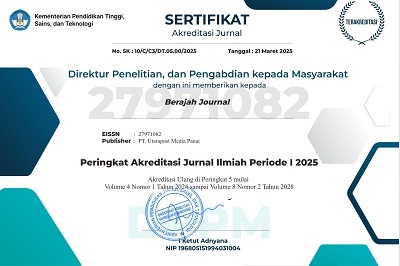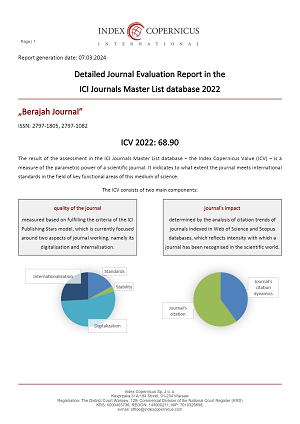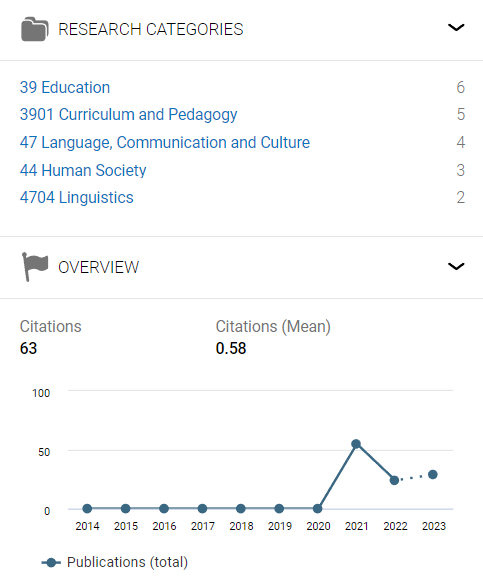DINAMIKA KEKERASAN DALAM RUMAH TANGGA: TINJAUAN LITERATUR
DOI:
https://doi.org/10.47353/bj.v4i1.291Keywords:
Complexity of problems, battered wife, coping strategies, domestic violenceAbstract
Domestic violence (DV) is often imagined as women experiencing physical violence, even though not all violence involves physical conditions, because not being injured does not mean experiencing violence. Many women suffer from emotional abuse, which is no less damaging to the victim or her family. This literature review aims to provide a better understanding of the form and impact of coping strategies used by wives of domestic violence victims, and the factors that determine the implementation of their coping strategies. This research can provide a foundation for the development of better interventions. The article search process has been carried out using three databases and the results of the review based on the Critical Appraissal Checklist obtained 12 eligible articles with details of 1 article from Science Direct, 1 article sourced from Google scholar and 10 articles from Scopus indexed journals. Based on the results of the literature review, the coping strategies of wives of domestic violence victims have been identified, the determinants of the form of coping strategies of wives of domestic violence victims, and the impact of coping strategies of wives of domestic violence victims. The results of this study are useful for formulating and developing integrated intervention approaches for victims of domestic violence.
Downloads
References
Abu-Elenin, M. M., Elshora, A. A., Sadaka, M. S., & Abdeldaim, D. E. (2022). Domestic violence against married women during the COVID-19 pandemic in Egypt. BMC Women’s Health, 22(1), 1–10. https://doi.org/10.1186/s12905-022-01674-5
Ajala, A. O. (2017). Intimate Partner Violence Correlates and Coping Strategies: A Qualitative Inquiry Among Ijesa of South-West Nigeria. Advances in Social Sciences Research Journal, 4(23), 64–81. http://dx.doi.org/10.14738/assrj.423.3916.
Almeida, I., Nobre, C., & Marques, J. (2023). Violence against Women : Attachment , Psychopathology , and Beliefs in Intimate Partner Violence. Social Sciences, 12(346), 2–11.
Alsawalqa, R. O. (2020). Economic Abuse of Women in Amman, Jordan: A Quantitative Study. SAGE Open, 10(4). https://doi.org/10.1177/2158244020982616
Alsawalqa, R. O. (2021). Evaluating Female Experiences of Electronic Dating Violence in Jordan: Motivations, Consequences, and Coping Strategies. Frontiers in Psychology, 12(November), 1–13. https://doi.org/10.3389/fpsyg.2021.719702
Asadi-Bidmeshki, E., Mohtashami, J., Hosseini, M., Saberi, S. M., & Nolan, F. (2021). Experience and coping strategies of women victims of domestic violence and their professional caregivers: A qualitative study. Neuropsychiatria i Neuropsychologia, 16(1–2), 92–100. https://doi.org/10.5114/nan.2021.105624
Balkanlioglu, M. A., & Ozinci, Z. (2022). Intimate Partner Violence Incidents and Solutions Reported by Turkish Couples in Long-Term Marriages: An Exploratory Qualitative Study. Qualitative Sociology Review, 28(3), 126–143. https://doi.org/10.18778/1733-8077.18.3.06
Batool, H., Mustafa, M., & Ahmad, S. (2022). A Phenomenological Analysis of Adoption of Coping Strategies Among Survivors of Acid Violence in Pakistan. Journal of Interpersonal Violence, 37(11–12), NP8696–NP8723. https://doi.org/10.1177/0886260520975863
Bayoumy, H. M. (2023). Trapped in the past: trauma in The Sins of the Mother and Outside Time. Humanities and Social Sciences Communications, 10(1), 1–9. https://doi.org/10.1057/s41599-023-01573-6
Benedicta, G. D., Hidayana, I., Noor, I. R., Kartikawati, R., Krim, M., Zahro, F. A., Susanti, L. R., Natih, N. N. S., Wahyuadi, D., & amadhan, F. R. (2017). A Qualitative Study on the Causes and Consequences of Divorce after Child Marriage in Sukabumi , Rembang and West Lombok Regencies.
Cardinali, P., Migliorini, L., Giribone, F., Bizzi, F., & Cavanna, D. (2018). Domestic violence in separated couples in Italian Context: Communalities and singularities of women and men experiences. Frontiers in Psychology, 9(SEP), 1–11. https://doi.org/10.3389/fpsyg.2018.01602
Carvalho, M. R. da S., Oliveira, J. F. de, Gomes, N. P., Campos, L. M., Almeida, L. C. G. de, & Santos, L. R. (2019). Coping strategies for domestic violence: Testimony of women involved with drugs. Escola Anna Nery, 23(2), 1–7. https://doi.org/10.1590/2177-9465-ean-2018-0291
Clark, C. J., Ferguson, G., Shrestha, B., Shrestha, P. N., Oakes, J. M., Gupta, J., McGhee, S., Cheong, Y. F., & Yount, K. M. (2018). Social norms and women’s risk of intimate partner violence in Nepal. Social Science and Medicine, 202(February), 162–169. https://doi.org/10.1016/j.socscimed.2018.02.017
Dwarumpudi, A., Mshana, G., Aloyce, D., Peter, E., Mchome, Z., Malibwa, D., Kapiga, S., & Stöckl, H. (2022). Coping responses to intimate partner violence: narratives of women in North-west Tanzania. Culture, Health and Sexuality, 0(0), 1–15. https://doi.org/10.1080/13691058.2022.2042738
Fernandes, B., Dias, P. C., & Lopes, S. (2023). Psychological Violence Within a Partner Relationship and Alcohol Abuse of Portuguese Women: The Mediating Role of Resilience. Family Journal, 31(4), 587–596. https://doi.org/10.1177/10664807221147026
Gibson, M. A., Gurmu, E., Cobo, B., Rueda, M. M., & Scott, I. M. (2022). Measuring Hidden Support for Physical Intimate Partner Violence: A List Randomization Experiment in South-Central Ethiopia. Journal of Interpersonal Violence, 37(7–8), NP4238–NP4257. https://doi.org/10.1177/0886260520914546
Han, Y., Kim, H., & An, N. (2022). Factors Associated with Coping Behaviors of Abused Women: Findings from the 2016 Domestic Violence Survey. Healthcare (Switzerland), 10(4). https://doi.org/10.3390/healthcare10040622
Hayati, E. N., Eriksson, M., Hakimi, M., Ulf Högberg, & Emmelin, M. (2015). “Elastic band strategy”: Women’s lived experiences of coping with domestic violence in rural Indonesia. Global Health Action, 8(1). https://doi.org/10.3402/gha.v6i0.18894
Huntley, A. L., Potter, L., Williamson, E., Malpass, A., Szilassy, E., & Feder, G. (2019). Help-seeking by male victims of domestic violence and abuse (DVA): A systematic review and qualitative evidence synthesis. BMJ Open, 9(6), 1–13. https://doi.org/10.1136/bmjopen-2018-021960
Kusumawaty, I., Suzana, Yunike & Majid, Y. A. (2023). The Voice of The Heart of Community Mental Health Lay educators : Between Honesty and Challenge. Jurnal Aisyah: Jurnal Ilmu Kesehatan, 8(1), 101–106. https://doi.org/10.30604/jika.v8i1.1
Jaliansyah, M. P. N. (2021). Critical Review of Domestic Violence as Reason for Divorce (Comparison of Divorce Laws in Indonesia, Malaysia and the Maldives). Al-Ihkam: Jurnal Hukum Dan Pranata Sosial, 16(1), 1–23. https://doi.org/10.19105/al-lhkam.v16i1.4292
Jardin, R. A., & Jaluague, J. A. (2022). Inner Strength and Coping Strategies of Women Victims of Domestic Violence in Cebu City , Philippines. Human Behavior, Development and Society, 23(3), 44–54.
Maríñez-Lora, A. M., & Cruz, M. L. (2017). Strengthening Positive Parenting in the Context of Intimate Partner Abuse. Clinical Case Studies, 16(1), 93–109. https://doi.org/10.1177/1534650116668272
Mas’udah, S., Megasari, L. A., & Saud, M. (2021). Women’s resistance to domestic violence during COVID-19 pandemic: A study from Indonesia. Jurnal Sosiologi Dialektika, 16(2), 163. https://doi.org/10.20473/jsd.v16i2.2021.163-174
Merchant, L. V., & Whiting, J. B. (2018). A Grounded Theory Study of How Couples Desist from Intimate Partner Violence. Journal of Marital and Family Therapy, 44(4), 590–605. https://doi.org/10.1111/jmft.12278
Nmadu, A. G., Jafaru, A., Dahiru, T., Joshua, I. A., Nwankwo, B., & Mohammed-Durosinlorun, A. (2022). Cross-sectional study on knowledge, attitude and prevalence of domestic violence among women in Kaduna, north-western Nigeria. BMJ Open, 12(3), 1–11. https://doi.org/10.1136/bmjopen-2021-051626
Nwafor, J. A., Chamdimba, E., Ajayi, A. I., Ushie, B. A., Munthali, A. C., Thakwalakwa, C., & Kabiru, C. W. (2023). Correlates of intimate partner violence among pregnant and parenting adolescents: a cross-sectional household survey in Blantyre District, Malawi. Reproductive Health, 20(1), 1–12. https://doi.org/10.1186/s12978-023-01606-y
Park, T., Mullins, A., Zahir, N., Salami, B., Lasiuk, G., & Hegadoren, K. (2021). Domestic Violence and Immigrant Women: A Glimpse Behind a Veiled Door. Violence Against Women, 27(15–16), 2910–2926. https://doi.org/10.1177/1077801220984174
Pires de Almeida, C., Sá, E., Cunha, F., & Pires, E. P. (2013). Violence during pregnancy and its effects on mother-baby relationship during pregnancy. Journal of Reproductive and Infant Psychology, 31(4), 370–380. https://doi.org/10.1080/02646838.2013.822058
Puente-Martínez, A., Ubillos-Landa, S., García-Zabala, M., & Páez-Rovira, D. (2019). “Mouth Wide Shut”: Strategies of Female Sex Workers for Coping With Intimate Partner Violence. Journal of Interpersonal Violence, 34(16), 3414-3437. https://doi.org/10.1177/0886260516670180
Rashidi Fakari, F., Ahmadi Doulabi, M., Mokhtaryan-Gilani, T., Akbarzadeh Baghban, A., & Hajian, S. (2022). A survey of coping strategies and resilience in women victims of domestic violence during the COVID-19 pandemic in Tehran, 2020. Brain and Behavior, 12(9), 1–8. https://doi.org/10.1002/brb3.2730
Ravindran, O., & Joseph, S. (2017). Loss of coping resources and psychological distress in spouses of alcohol dependents following partner violence. Indian Journal of Social Psychiatry, 33(3), 202. https://doi.org/10.4103/0971-9962.214594
Sani, A. I., & Pereira, D. (2020). Mothers as victims of intimate partner violence: The decision to leave or stay and resilience-oriented intervention. Social Sciences, 9(10), 1–13. https://doi.org/10.3390/socsci9100174
Shayestefar, M., Saffari, M., Gholamhosseinzadeh, R., Nobahar, M., Mirmohammadkhani, M., Shahcheragh, S. H., & Khosravi, Z. (2023). A qualitative quantitative mixed methods study of domestic violence against women. BMC Women’s Health, 23(1), 1–9. https://doi.org/10.1186/s12905-023-02483-0
Simonič, B. (2021). The Power of Women’s Faith in Coping with Intimate Partner Violence: Systematic Literature Review. Journal of Religion and Health, 60(6), 4278–4295. https://doi.org/10.1007/s10943-021-01222-9
St Vil, N. M., Sabri, B., Nwokolo, V., Alexander, K. A., & Campbell, J. C. (2017). A qualitative study of survival strategies used by low-income black women who experience intimate partner violence. Social Work (United States), 62(1), 63–71. https://doi.org/10.1093/sw/sww080
Stensvehagen, M. T., Bronken, B. A., Lien, L., & Larsson, G. (2022). Interrelationship of Posttraumatic Stress, Hassles, Uplifts, and Coping in Women With a History of Severe Sexual Abuse: A Cross-Sectional Study. Journal of Interpersonal Violence, 37(5–6), 2289–2309. https://doi.org/10.1177/0886260520935479
Sugiarti, R., Erlangga, E., Suhariadi, F., Winta, M. V. I., & Pribadi, A. S. (2022). The influence of parenting on building character in adolescents. Heliyon, 8(5). https://doi.org/10.1016/j.heliyon.2022.e09349
Sukeri, S., & Man, N. N. N. (2017). Escaping domestic violence: A qualitative study of women who left their abusive husbands. Journal of Taibah University Medical Sciences, 12(6), 477–482. https://doi.org/10.1016/j.jtumed.2017.05.009
Valle Pico, M. I., & Larzabal Fernández, A. (2022). Stress, psychological distress, psychological well-being and life satisfaction according to work modalities in mothers of families. Ciencias Psicologicas, 16(2), 1–16. https://doi.org/10.22235/cp.v16i2.2794
van der Putten, M., & Nur-E-Jannat, A. (2022). Coping with domestic violence: women’s voices in Bangladesh. Journal of Health Research, 36(1), 77–88. https://doi.org/10.1108/JHR-02-2020-0026
Winfield, A., Hilton, N. Z., Poon, J., Straatman, A. L., & Jaffe, P. G. (2023). Coping Strategies in Women and Children Living with Domestic Violence: Staying Alive. Journal of Family Violence, 0123456789. https://doi.org/10.1007/s10896-022-00488-1
Yunike, Y., Kusumawaty, I., & Martini, S. (2021). Mengedukasi orang tua siswa di sekolah alam palembang tentang pengasuhan positif. Salingka Abdimas, 1(2), 78–82.
Yusof, M. M., Azman, A., Singh, P. S. J., & Yahaya, M. (2022). A Qualitative Analysis of the Coping Strategies of Female Victimisation After Separation. Journal of Human Rights and Social Work, 7(1), 84–90. https://doi.org/10.1007/s41134-021-00199-5.
Downloads
Published
How to Cite
Issue
Section
License
Copyright (c) 2024 Ira Kusumawaty, Yunike, Mulya Virgonita Iswindari Winta

This work is licensed under a Creative Commons Attribution 4.0 International License.




























